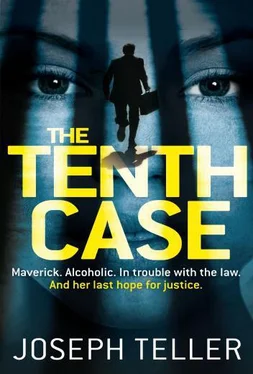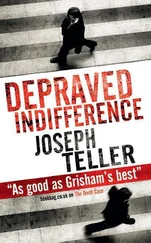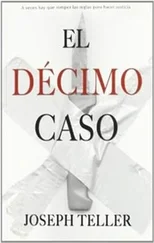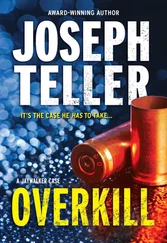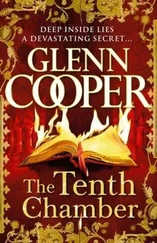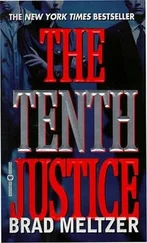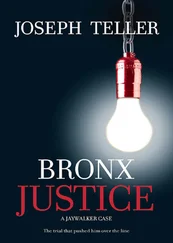Joseph Teller - The Tenth Case
Здесь есть возможность читать онлайн «Joseph Teller - The Tenth Case» — ознакомительный отрывок электронной книги совершенно бесплатно, а после прочтения отрывка купить полную версию. В некоторых случаях можно слушать аудио, скачать через торрент в формате fb2 и присутствует краткое содержание. Жанр: Криминальный детектив, на английском языке. Описание произведения, (предисловие) а так же отзывы посетителей доступны на портале библиотеки ЛибКат.
- Название:The Tenth Case
- Автор:
- Жанр:
- Год:неизвестен
- ISBN:нет данных
- Рейтинг книги:3 / 5. Голосов: 1
-
Избранное:Добавить в избранное
- Отзывы:
-
Ваша оценка:
- 60
- 1
- 2
- 3
- 4
- 5
The Tenth Case: краткое содержание, описание и аннотация
Предлагаем к чтению аннотацию, описание, краткое содержание или предисловие (зависит от того, что написал сам автор книги «The Tenth Case»). Если вы не нашли необходимую информацию о книге — напишите в комментариях, мы постараемся отыскать её.
The Tenth Case — читать онлайн ознакомительный отрывок
Ниже представлен текст книги, разбитый по страницам. Система сохранения места последней прочитанной страницы, позволяет с удобством читать онлайн бесплатно книгу «The Tenth Case», без необходимости каждый раз заново искать на чём Вы остановились. Поставьте закладку, и сможете в любой момент перейти на страницу, на которой закончили чтение.
Интервал:
Закладка:
Jaywalker remembered the night. He nodded, though he wasn't quite sure what the connection was.
"I guess I was afraid that if I told you about the old stabbing, you'd never believe I was innocent, not in a million years…"
As guesses go, it was a pretty reasonable one.
"And as a result, you wouldn't have fought for me as hard."
The words stung him. In a single sentence, she'd knocked Jaywalker down to the level of every other lawyer in the world, the last place he wanted to be. But who could blame her? What it meant was that he'd failed her. In his egocentric concern over the prospect of losing his last trial, he had failed to convince Samara that he was different from all the rest of them. Who could possibly have ex pected her to understand that while the knowledge of the earlier stabbing might have been too much for every other defense lawyer in the world to have overcome, it wouldn't have mattered to him? That when it came time to go to war, Jaywalker fought for those he believed to be guilty no less than he fought for those he believed to be innocent?
Long ago, he'd heard that Abraham Lincoln had once boasted that he would never represent a guilty defendant. Lincoln might have been a great man, but in Jaywalker's book that one remark, if accurately quoted, branded him as an absolutely worthless criminal defense lawyer. Who was he to decide that help should be extended only to the virtuous and withheld from the sinners? To Jaywalker, it smacked of tax relief for only the wealthy. Luckily, and in spite of his gross misunderstanding of the defender's role, Lincoln had somehow managed to find other work, though, perhaps tellingly, as a Republican.
Matthew Sobel, who Jaywalker considered as fair and temperate a judge as there was in the system, couldn't conceal his disappointment when Jaywalker reported to him that there would be no guilty plea. He shook his head in something between disbelief and frustration, and the look on his face turned absolutely grave. It was obvious to Jaywalker that Sobel wasn't looking forward to sentenc ing Samara to life in prison. Yet that was exactly what the law would require him to do in the event of a conviction- an eventuality that was rapidly becoming a certainty.
To be fair to Samara, she did about as well as she possibly could have on the remainder of Burke's crossexamination, looking him squarely in the eye and answer ing every question he threw her way. She readily confessed to the fourteen-year-old stabbing, admitting that she'd done it at a point when her attacker had been sound asleep and no longer a threat to her. And she didn't flinch before an swering that, yes, she'd tried to kill the man and had even assumed she'd succeeded in doing so. Two weeks later, she'd happened to pick up a newspaper in Reno and had rec ognized Roger McBride in a photo buried near the back of the paper. McBride, described as the "random victim of a deranged teenager," was said to have miraculously survived a near-death experience and was shown leaving the hospital in a wheelchair, accompanied by his wife and two daugh ters. A warrant had been issued for the teenager's arrest.
As forthcoming as Samara was about the old assault, she wouldn't give an inch when Burke attempted to establish a link between the McBride assault and the murder of Barry Tannenbaum, with Samara's rage proposed as the common denominator. On five consecutive occasions, Burke began his questions with the phrase, "Isn't it a fact," trying to get her to admit that she'd stabbed both men. She listened patiently to each question before answering, "No, it isn't a fact," five times. Of course, the questions were never meant for her in the first place. Burke was much too smart to expect her to suddenly find religion at this late stage of the game and confess her guilt, too smart even to hope that she might commit some Freudian slip of the tongue and give herself away, however slightly. No, his questions were for the jurors; he was giving them a sneak preview of his summation, only in question form. And their faces, every one of them as grave as the judge's had been earlier, told Jaywalker everything he needed to know.
Bottom?
Rock bottom?
Right now they were beneath the ocean floor itself. They were miles down, down where the molten iron core of the planet lay. Down where life as we know it cannot exist.
Whatever other cross-examination Burke had saved for Samara from the previous afternoon, he decided to leave it on his notepad, choosing instead to end with his devas tating series of Isn't-it-a-fact questions.
Jaywalker managed to pry himself up from his seat and spend fifteen minutes on redirect. He had no real hope of rehabilitating Samara; she was way beyond rehabilitation by that point. But he couldn't let Burke have the last word, not with the jurors about to depart for the weekend. So he picked and chose from his notes, pretending it still mattered. He asked Samara when she'd first learned her husband had cancer; she replied that it hadn't been until Jaywalker himself had read Barry's autopsy report to her. Did she understand the meaning of the phrase, a spouse's right to take against the will? No, she'd never heard it and had no idea what the words meant.
Lame stuff like that.
When Burke avoided the temptation of overkill and declined to recross Samara, Jaywalker stood up and an nounced that the defense was resting. He tried to do it in his firmest, most confident voice, but he knew full well that he wasn't fooling anyone. Not the jurors, not the specta tors, not his client, not the judge. Not even himself.
"And The People rest, as well," echoed Burke.
Judge Sobel read the jurors his usual admonitions. He instructed them to report back Monday morning for the lawyers' summations, the court's charge and their delibera tions. He told them the court officers would be giving them additional instruction regarding bringing an overnight bag with toilet articles and a change of clothes, in the event that their deliberations were to go over to a second day. Jay walker noticed that the judge seemed to go out of his way to avoid mentioning the term sequestration, much the way doctors of an earlier generation used to refrain from utter ing the word cancer. But this being a murder trial, once the jurors were given the case to decide, they wouldn't be per mitted to return to their homes, families and jobs until such time as they reached either a verdict or an intractable impasse. Jaywalker could have waived the sequestration rule, had he chosen to. But he actually liked the idea of jurors being locked up, even if only overnight and in some motel out by LaGuardia Airport. Let them get a taste of what it was like to sleep in a strange bed, doubled up with a roommate not of their own choosing, having been told what TV programs they could or couldn't watch and what newspapers they could or couldn't read. Maybe they would think twice before sending someone off to prison for years of infinitely tighter restrictions.
With the jurors excused, the judge spent the next fortyfive minutes explaining what he intended to include in his charge to the jury. Jaywalker had a few additional requests and a couple of objections, but it was all pretty standard stuff. About the only point of contention was the stabbing of Roger McBride, the prior similar act, and the way in which the jury could and could not use it.
Then, just before one o'clock, Burke rose to make a request. Jaywalker had in fact been expecting it for some time now, dreading it. He'd even dared to think that Burke might somehow forget to do it, or decide not to. No such luck.
"Based on this morning's developments," Burke said in an even, untheatrical voice, "which reveal not only a prior stabbing to the chest of another victim, but also an admitted history of flight, complete with a name change, The People ask that the defendant's bail be exonerated at this time, and that she be remanded."
Читать дальшеИнтервал:
Закладка:
Похожие книги на «The Tenth Case»
Представляем Вашему вниманию похожие книги на «The Tenth Case» списком для выбора. Мы отобрали схожую по названию и смыслу литературу в надежде предоставить читателям больше вариантов отыскать новые, интересные, ещё непрочитанные произведения.
Обсуждение, отзывы о книге «The Tenth Case» и просто собственные мнения читателей. Оставьте ваши комментарии, напишите, что Вы думаете о произведении, его смысле или главных героях. Укажите что конкретно понравилось, а что нет, и почему Вы так считаете.
